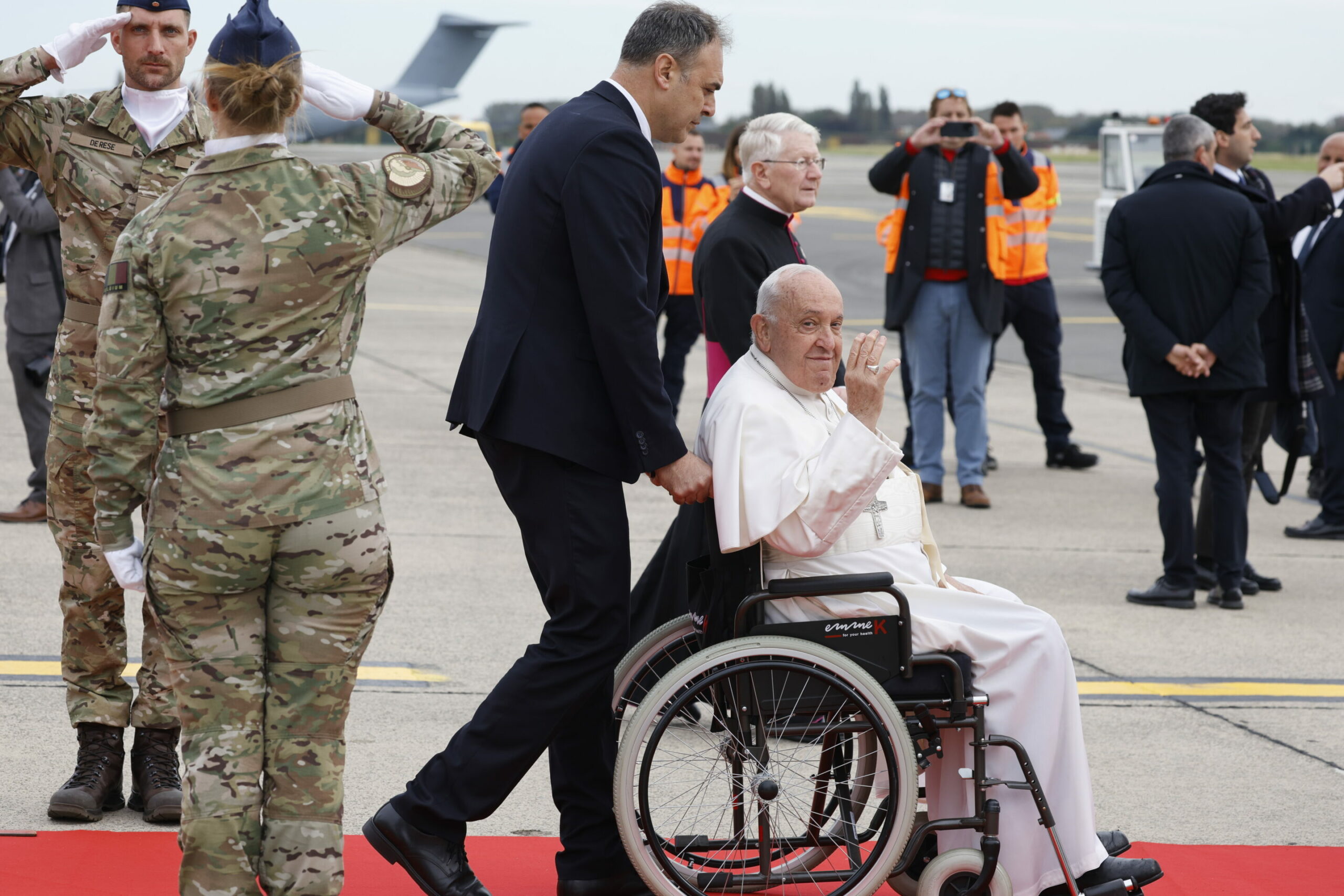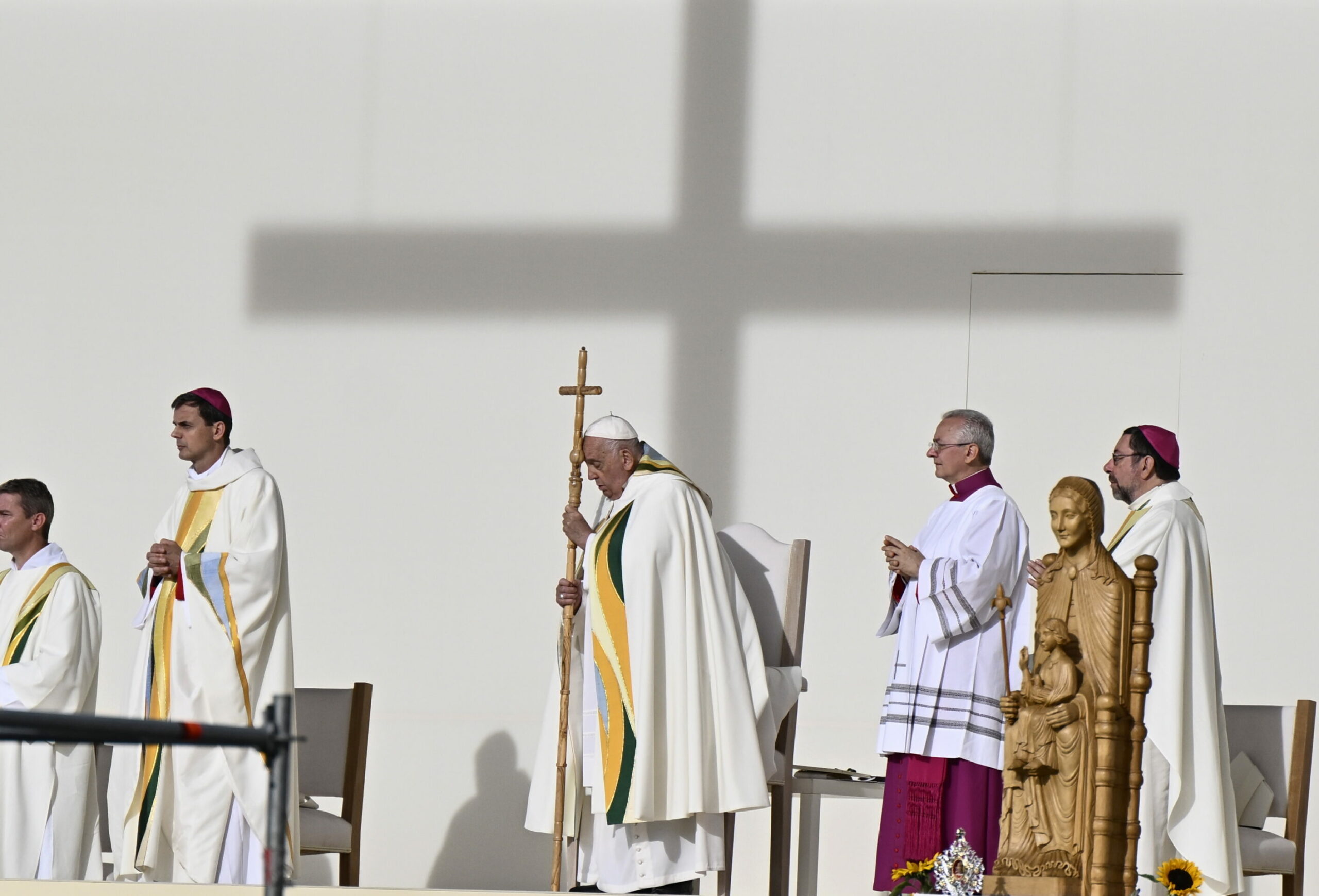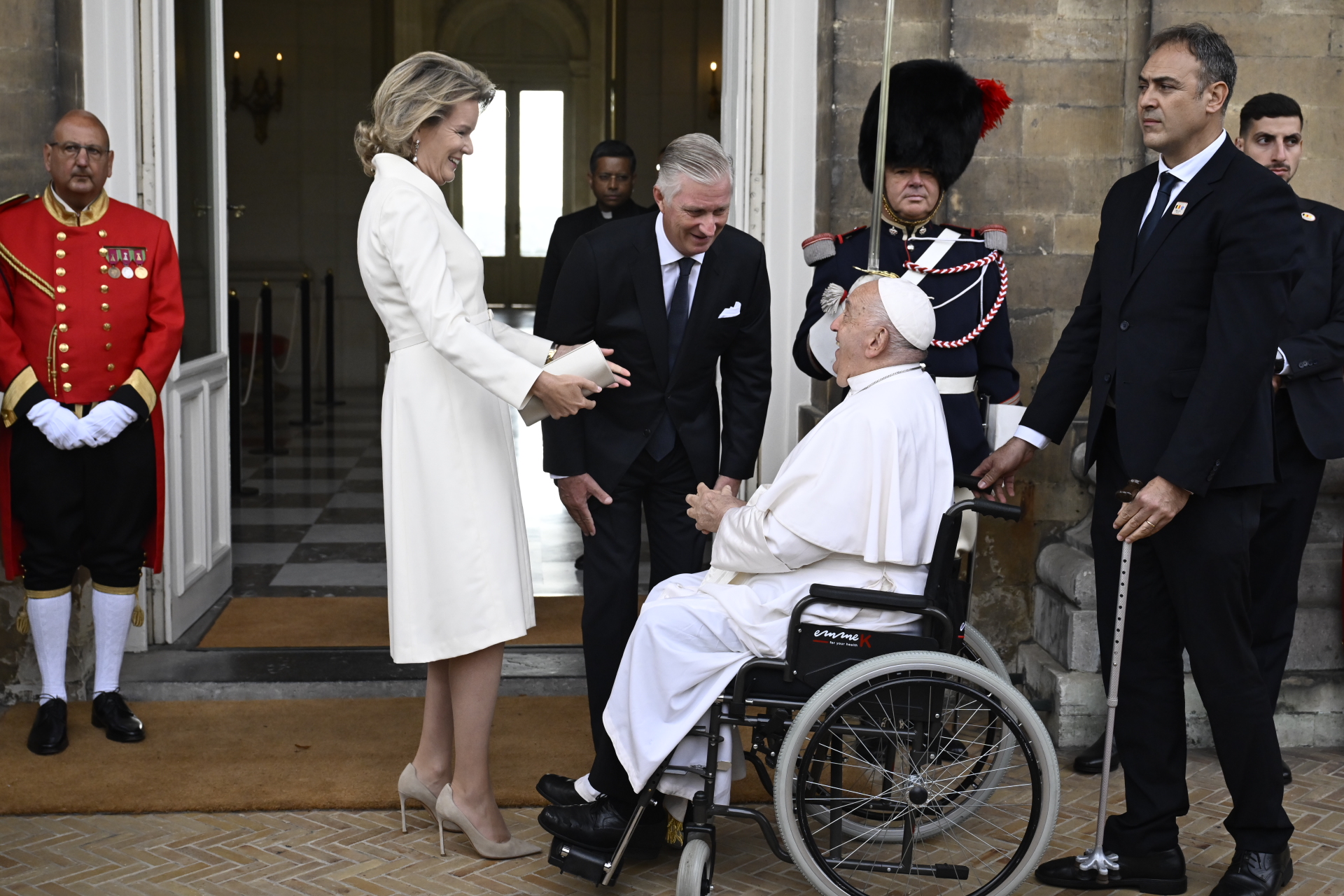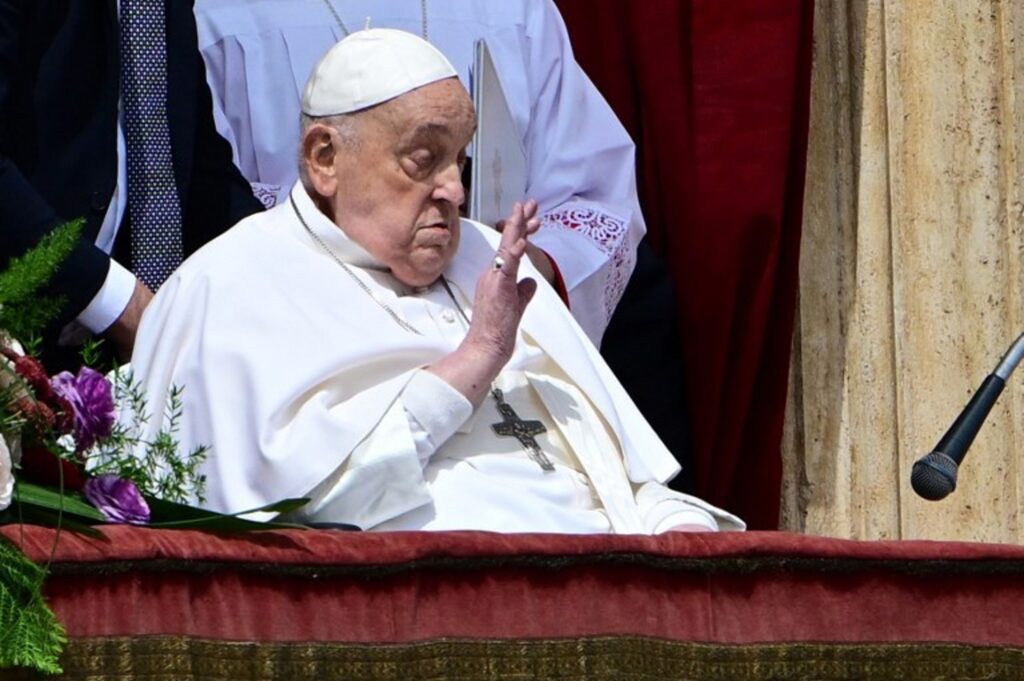Pope Francis died on Easter Monday, at the age of 88, at his residence in the Vatican's Casa Santa Marta, the Vatican announced on Monday morning.
The news comes a day after the Pope appeared on the balcony of St. Peter's Basilica in Rome on Easter Sunday to deliver his traditional Urbi et Orbi blessing.
The 88-year-old pope, who received loud applause, was brought onto the balcony in a wheelchair and spoke in a frail voice, extending Easter greetings to the thousands of faithful gathered in St. Peter’s Square.
The Pope had been recovering from a severe bout of pneumonia and was discharged from the hospital about a month ago. Due to his health condition, there were uncertainties about whether he would be able to deliver the Urbi et Orbi blessing. During the Easter Mass, Italian Cardinal Angelo Comastri officiated in his place.
An inspiration to millions
Belgian Prime Minister Bart De Wever (N-VA) responded to the death of Pope Francis in Latin on Monday. "Requiem aeternam dona ei, Domine, et lux perpetua luceat ei," he posted on X, which translates as "Lord, give him eternal rest, and may perpetual light shine upon him." The sentence comes from the Catholic requiem, a mass dedicated to the deceased.
The bishops of Belgium also expressed their "great sadness" and "gratitude" on Monday morning following the death of Pope Francis, whose pontificate was "marked by simplicity, closeness to the poor and a powerful call for mercy and social justice." The bishops also highlighted Francis' visit to Belgium in September 2024.
King Philippe and Queen Mathilde learned "with great sadness" of the death of Pope Francis. "He was a great man, close to the most humble and concerned about the world's problems," the royal couple said.
"We share the grief of all Catholics around the world and of all those who loved and appreciated him. We also express our gratitude for the honour he has done us by visiting our country," they added.
EU leaders paid tribute on Monday to Pope Francis, praising his sense of equality and "his pure love for the most disadvantaged," in the words of European Commission President Ursula von der Leyen.
"He inspired millions of people, far beyond the Catholic Church, with his humility and his pure love for the most disadvantaged," von der Leyen said on the X network. "My thoughts are with all those who feel this profound loss."
On the same social network, European Council President António Costa expressed his hope that Pope Francis' ideas would continue to "guide us towards a future of hope," despite the international context and numerous conflicts.
"He was deeply compassionate. He cared about the great global challenges of our time – migration, climate change, inequality, peace - as well as the daily struggles of everyone," Costa continued.
"His infectious smile won the hearts of millions of people around the world," said European Parliament President Roberta Metsola.
First non-European pope
The pope, whose real name is Jorge Mario Bergoglio, was the cardinal elected to lead the Catholic Church in March 2013, after Pope Benedict XVI stood down. The Argentine became the first-ever Pope from South America.
Bergoglio, who chose the papal name Francis, was also the first Jesuit to become pope, the first pope from the southern hemisphere and the first non-European pope in nearly 1,300 years.
During his pontificate, he paid close attention to the poor and refugees, among others, but views from Rome around abortion or celibacy changed little in recent years. A visit to Belgium, in September 2024, came in light of sexual abuse within the Church.
In 2005, after the death of John Paul II, the Argentine Jesuit was already considered the moderate rival of Joseph Ratzinger, later Pope Benedict XVI. That Bergoglio did make it eight years later, at 76, was somewhat unexpected because he was considered by many Vatican watchers to be too old to succeed a pope who had just resigned because of his advanced age.

Pope Francis arrives for his departure home, from the military airport in Melsbroek, Steenokkerzeel on Sunday 29 September 2024. Credit: Belga / Nicolas Maeterlinck
Bergoglio was the first pope to choose to name himself after Francis of Assisi. This was a real programme statement for his pontificate, in which he paid great attention to the poor and weak. Additionally, it also indicated that as Pope he would not deviate from the austere and humble life he already led in Buenos Aires.
Immediately after his election, he appeared on the balcony dressed simply in white, while his predecessors usually opted for pomp and circumstance. With his sober lifestyle, he also appealed to non-believers – nice for an institution that critics said had become unworldly.
Francis saw his role, and that of the Church, as a missionary among the people: a humble Church that promotes the faith and does not necessarily wave the finger. Even as an ordinary priest, he regularly visited the slums of Buenos Aires. He spoke out for social justice, against unbridled capitalism and repeatedly advocated action in the fight against global warming.
With visits to the Italian island of Lampedusa, he insisted on the humane treatment of refugees. Francis also emphatically welcomed back into the fold other groups previously ignored by the Vatican. At his first foot-washing as pope, just before Easter 2013, Francis went down on his knees for female and Muslim prisoners.
More socially conscious
He deviated only slightly from the strict sexual morality imposed by the Vatican, although he was more socially conscious in the discussion than his predecessors. Under Francis' pontificate, the Vatican became more attentive to the LGBTQ+ community, but without allowing same-sex marriage. "Who am I to judge?" he said.
In late 2023, the Vatican allowed priests to bless LGBTQ+ relationships, although such a blessing is not equivalent to the sacrament of marriage. Additionally, a blessing is a favour, not a right that believers can claim.
In the papal letter 'Amoris laetitia' (2016), the Pope made a case for allowing remarried believers to take communion anyway – which resulted in heavy criticism from conservative members of the faith.

Pope Francis leads a holy mass at the King Baudouin Stadium in Brussels on Sunday 29 September 2024. Credit: Belga/Eric Lalmand
Regarding abortion, conservatives still found Francis on their side: the Argentine considered it a grave sin. Although he felt it was "not necessary" for a believer to talk about abortion, gay marriage and contraception all the time. "When we talk about that, we have to look at the context, case by case," he said.
On the way back from his visit to Belgium in September 2024, he still harshly criticises doctors who perform abortions, calling them "hitmen."
"Women have the right to life: their life and the life of their children," the Pope said. "Abortion is murder, a human being is being killed." During the visit, the Pope had already praised King Baudouin's courage in the abortion debate, and announced that he would start the process for Baudouin's beatification.
On the issue of women priests, Francis continued to hold off the boat, although he made some openings there too, for example around women deacons.
Outspoken against abuse
Upon taking office, Francis found a Church in crisis, due to financial scandals within the Vatican Bank and widespread child sexual abuse. Against money laundering and corruption, he acted by closing suspicious accounts and mandating audits. His handling of the abuse scandals remained subject to fermenting criticism throughout his pontificate, although that perception has quietly turned in recent years.
The abuse theme was also central to Francis' visit to Belgium. At various points, including during a two-hour meeting with 15 victims, he mentioned sexual abuse. Most of those present expressed positive views afterwards. In a speech at the Palace, he deviated from his prepared text and stated that the Church should be ashamed and ask for forgiveness. The Belgian bishops were advised "not to cover up abuses and to condemn abusers."
Jorge Mario Bergoglio was born in Buenos Aires on 17 December 1936, the son of Italian immigrants. He attended public school, earned some money as a bouncer and worked for a while as a chemical engineer.
He joined the Jesuits as a novice in 1958, and priestly ordination followed in late 1969. Just four years later, in 1973, he joined the Argentine Jesuit leadership, where he remained until 1979.

Pope Francis is greeted at the Royal Castle in Laeken, Brussels on Friday 27 September 2024. Credit: Belga / Dirk Waem
From 1976, the country was led by a violent military dictatorship for almost eight years. Liberation theologians within the Jesuits felt they could not remain aloof in opposition to the dictatorship, and clashed with Bergoglio, who chose to keep the order non-political.
Under the military dictatorship, up to 30,000 suspected supporters of the left disappeared, including Jesuits. For example, two Jesuits were jailed for five months after Bergoglio allegedly revoked their protection of the order. Bergoglio himself denied this, and one of the two brothers also later revealed that their superior had nothing to do with their imprisonment.
Other authoritative Argentine sources say Bergoglio was not an accomplice of the regime, but was perhaps slightly less courageous than other priests.
In the 1980s, he spent some time in Ireland and Germany, eventually resuming his activity as an ordinary priest in the city of Cordoba. His alienation from the Jesuits led to his being appointed auxiliary bishop of Buenos Aires in 1992. "Maybe a bad Jesuit can become a good bishop," an Argentine Jesuit is reported to have said at the time.
Football and tango
In 1998, Bergoglio became archbishop of Buenos Aires, and was appointed cardinal in 2001. One of his main initiatives at the time was to sensitively expand the Church's presence in the slums.
As cardinal, he repeatedly confronted the Néstor and Cristina Kirchner governments in Argentina, who led the country from 2003 to 2015 and considered the later Pope a political rival. Indeed, he criticised corruption and poverty in Argentina, and he opposed (unsuccessfully) the legalisation of same-sex marriage in Argentina.
A purebred Argentine, Francis was also a big football fan: San Lorenzo, a Buenos Aires-based club, is the club of his heart. And in an interview, he admitted that he likes to tango dance. "Someone from Buenos Aires who does not dance tango is not from Buenos Aires," he said.
In August 2021, the first rumours of a possible resignation arose, due to Francis' health problems. Over the months and years, the Vatican regularly reported hof the Pope's health problems, but that did not stop him from still undertaking major trips. Just before travelling to Belgium, he had finished a long trip to Indonesia and Papua New Guinea, among other places.
In interviews, Francis regularly indicated that he would resign if his health no longer allowed him to lead the Church.

